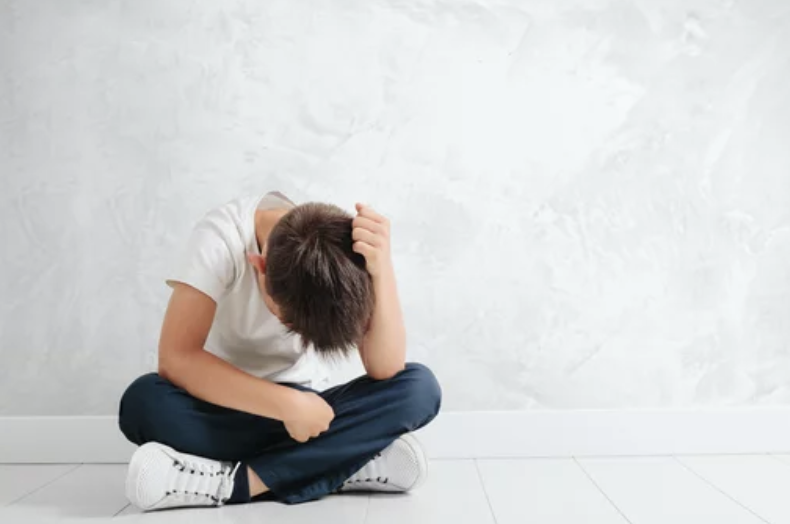What is Depression and Dysthymia in Children? Identifying, Symptoms, and Treatment.

Depression is a serious mental health condition that can dramatically impact a child’s mood and thoughts. Affecting various aspects of a child’s life, potentially leading to school absences, difficulties in socializing with peers and making friends, and in severe cases, even thoughts of suicide. Understanding depression in children and differentiating it from a related condition called dysthymia is crucial for early intervention and effective treatment.
Depression vs. Dysthymia:
There are two types of depression; major depression and dysthymia. The severity of the depression and length of the depression are what differentiate the two.
Major Depression:
Major depression is characterized by episodes that last for at least two weeks and can recur throughout a child’s life.
Dysthymia:
Dysthymia is a chronic and less severe form of depression that persists for more than a year.
While the core symptoms of depression and dysthymia share similarities, such as a persistent sad mood and having negative self-perception, the severity and duration of these symptoms are what differentiate the two conditions.
Common Symptoms:
Recognizing the symptoms of depression or dysthymia in children is essential for timely intervention. The symptoms may include:
- Depressed or irritable mood, restlessness
- Decreased interest in activities and the inability to enjoy previously favorite activities
- Low self-esteem and feelings of worthlessness
- Frequent sadness or crying
- Poor concentration and difficulty making decisions
- Major changes in eating and sleeping patterns
- Expressing thoughts of wanting to be dead or having suicidal thoughts.
- Social withdrawal and refusal to attend school
- Unexplained general medical complaints, such as headaches or stomachaches
At times it may be difficult to tell if a child is just going through a temporary “phase” or is suffering from depression. When symptoms last for a short period, it may be a passing case of “the blues”; but if they last for more than two weeks and interfere with regular daily activities, family, and school life, your child should be evaluated for a depressive disorder. When a child has a depressive disorder, symptoms of depression appear as a distinct shift from your child or teen’s previous functioning. Parents usually notice a change in their child’s behavior, or a teacher may mention the child “doesn’t seem to be himself”.
Causes of Depression:
Several factors contribute to the development of depression and dysthymia in children and adolescents, including:
- Parental history of depression or mood disorders
- Parental conflicts
- Poor peer relationships
- Negative temperament
- Experiencing stress or loss
- Co-occurring attentional, learning, conduct, or anxiety disorders
At any given point in time 5% of children and adolescents in the general population experience depression. Before the age of 15, more than 7% of children go through an episode of major depression. Notably, girls are twice as likely as boys to experience depressive episodes by the age of 15.
Treatment for Depression:
Seeking professional help is the first step in addressing depression in children. A pediatrician can rule out medical conditions like diabetes or hypothyroidism that may cause similar symptoms. Typical treatment approaches for children with depression include various forms of psychotherapy, such as psychodynamic, cognitive-behavioral therapy, interpersonal therapy, and family therapy. Behavioral interventions and instructions in social and interpersonal skills can also be part of the treatment plan.
In some cases, a pediatrician or psychiatrist might discuss the option of medication as part of the treatment plan. The FDA has two drugs for use in children diagnosed with depression. Prozac for children 8 years and over, and Lexapro for kids 12 years and older. Without treatment children with depression risk relapse, the earlier treatment starts, the better the outcome. Improvement may take time, ranging from weeks to months of treatment. Treating any co-occurring conditions, such as an anxiety disorder, is important because they can influence the maintenance and recurrence of depression, and lengthen the duration of the depressive episode.
Understanding depression and dysthymia in children is the first step in providing the necessary support and treatment. Early intervention is key to helping children overcome the challenges associated with these conditions and to improve their overall well-being.
Frequently Asked Questions (FAQs)
What is Depression in children, and how does it affect them?
Depression is a serious mental health condition that can impact a child’s life. The child’s mood and thoughts, it can lead to things like missing school, trouble making friends, and sometimes even thinking about suicide.
Can Depression in children be prevented?
While it can not always be prevented, you can reduce the risk by creating a supportive and open environment at home. Talking to your child about any challenges is helpful. Helping your child build strong social connections, and teaching them how to manage stress.
How do I talk to my child about their depression?
It is important to note that you have to approach the topic with care and understanding. Listen to their feelings, assure them that you as their parent are there to support them, and consider involving a mental health professional for guidance.
Is Depression in children the same as in adults?
Depression in children can manifest differently from adults. Children may not always express what they’re feeling in the same way adults can, which can make diagnosis and understanding challenging.
Can children outgrow Depression on their own?
While some children may experience temporary low moods, clinical depression typically requires treatment. It is not advisable to rely on children to outgrow it without any sort of intervention. It is better to seek treatment as soon as possible before it gets any worse.
We serve patients from Long Island City, NY, and New York, NY




